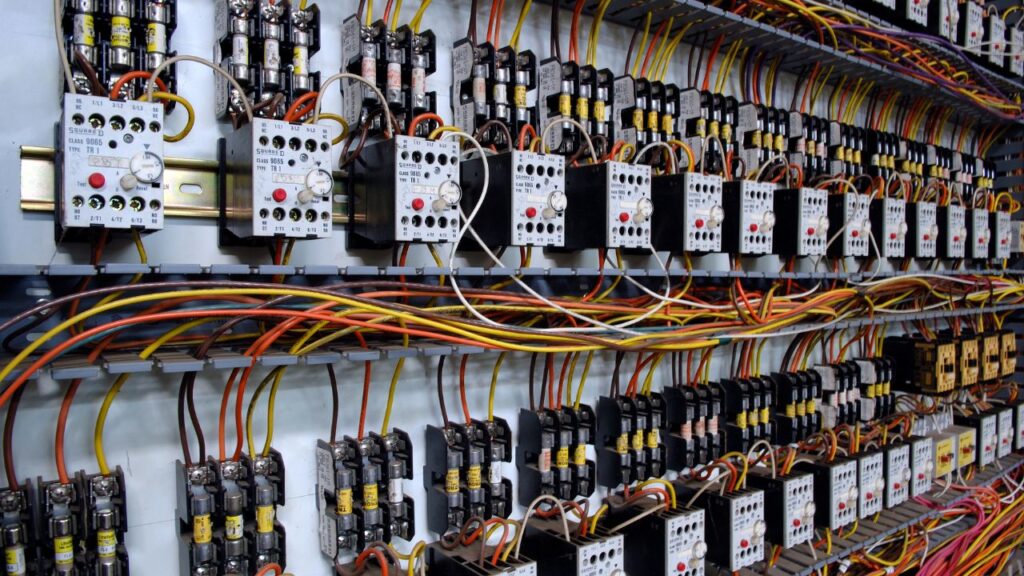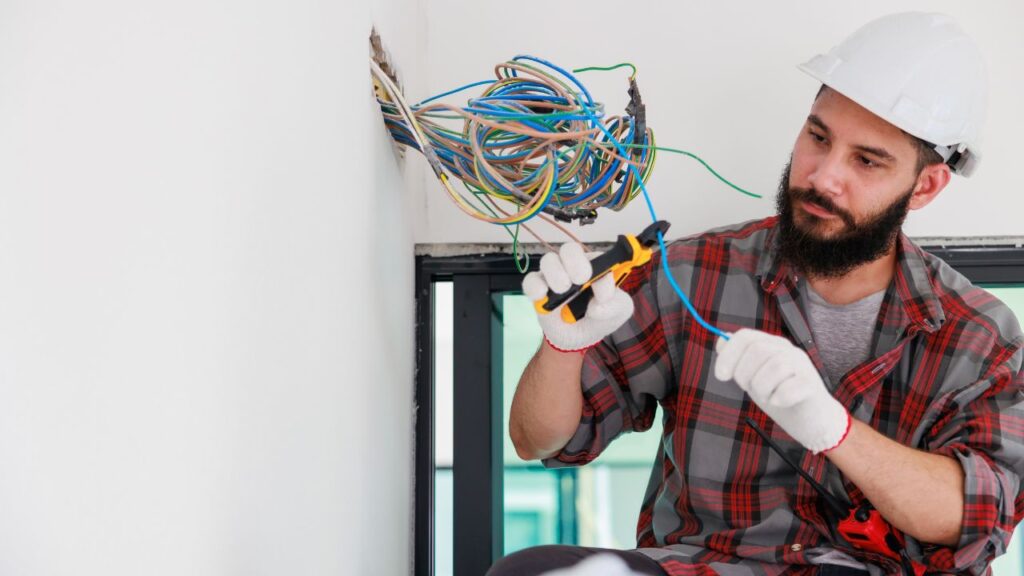Bid Confidently, Win Consistently – Zip Code Estimates Made Easy!
- Accurancy
- Efficiency
- Transparency
- Customization
- Time Saving
- Professionalism
- Cost Control

When considering the cost of rewiring a 2400 square foot home, it typically ranges between $4 and $8 per square foot, covering both labor and materials. Electricians base their charges on various factors such as the complexity of the wiring job, the type of materials needed, and the location of the property. For a 2400 square foot home, the total cost could amount to approximately $9600 to $19200. Factors such as the age of the home, accessibility of wiring areas, and local regulations may also influence the final pricing. At Estimate Florida Consulting, we provide estimates for your projects.


Fully Insured License
Hire Contractor For Electrical Rewiring

Make Informed Design Decisions Showcase Your Design Ideas
Get RenderingHome rewiring involves the process of replacing or updating the electrical wiring system in a residential house.
This maintenance task is essential for ensuring a safe and efficient electrical system within a home. Over time, wiring can deteriorate, become outdated, or pose safety hazards due to wear and tear.
Electricians play a crucial role in performing rewiring tasks, as they are trained to assess, install, and repair electrical systems. Proper wiring is vital for households to prevent electrical fires, reduce the risk of electrical shocks, and ensure that appliances and devices operate smoothly without any disruptions. By investing in home rewiring, homeowners can improve the overall safety and functionality of their living spaces.
Home rewiring is necessary to ensure electrical safety, meet current regulations, and address potential hazards associated with outdated wiring.
By upgrading the wiring in your home, you not only decrease the risk of electrical fires but also prevent shocks and other dangerous situations that can arise from faulty wiring. Meeting current electrical codes is essential to protect your home and ensure the safety of its occupants.
Modernizing your wiring system can increase the overall value of your property and make it more attractive to potential buyers. These upgrades also pave the way for advanced technology integration, enhancing the functionality and efficiency of your home.
When considering the cost of rewiring a 2400 square foot home, homeowners must take into account several crucial factors that influence the overall expense.
Here’s an expanded table with additional cost details for home rewiring:
Cost Component | Cost Range |
Labor (Based on complexity) | $4,000 – $8,000 |
Materials (Depends on quality and quantity) | $5,600 – $11,200 |
Permitting and Inspection | $400 – $800 |
Additional Wiring Features | $1,200 – $2,400 |
Unexpected Repairs | $800 – $1,600 |
Total Cost Range | $12,000 – $24,000 |
The size of the home is a primary determinant of rewiring costs. Larger homes necessitate more wiring and materials, driving up the total expenditure. For a 2400 square foot home, the total cost could amount to approximately $9,600 to $19,200, covering both labor and materials.
The complexity of the wiring job significantly impacts the cost. Homes with intricate electrical systems or specific requirements may require additional labor and materials. Factors such as multiple circuits, specialized lighting installations, or smart home integration contribute to increased complexity and subsequent costs.
The choice of materials used in the rewiring process directly affects the overall cost. Premium-grade wiring, switches, outlets, and circuit breakers typically come at a higher price point compared to standard materials. Moreover, factors such as wire gauge, insulation quality, and the need for surge protection devices influence material expenses.
The age of the home plays a critical role in determining rewiring costs. Older homes often have outdated electrical systems that may not meet current safety standards. Upgrading antiquated wiring to modern specifications may require extensive labor and material investments, contributing to higher overall costs.

The accessibility of wiring areas within the home impacts the complexity of the rewiring process. Hard-to-reach spaces, concealed wiring, or areas obstructed by existing structures may require additional effort from electricians. Accessibility challenges often translate to increased labor costs, especially if extensive modifications are necessary to access wiring routes.
Adhering to local building codes and regulations is crucial during home rewiring projects. Obtaining permits and ensuring compliance with safety standards are integral parts of the process. Expenses related to permits, inspections, and compliance measures may add to the overall cost of the rewiring project.
Taking into consideration the aforementioned factors, the cost breakdown for rewiring a 2400 square foot home typically includes:
Electricians usually charge for home rewiring based on hourly rates, flat fees, per fixture/outlet charges, per square foot charges, and material costs, with additional service fees as applicable.
Electricians may charge hourly rates for home rewiring services, with costs varying based on the complexity of the project, maintenance tasks, and additional electrical projects involved.

Some electricians offer flat fees for home rewiring, providing a comprehensive quote that includes the total cost of labor, materials, electrical devices, and tools required for the project.
This approach simplifies pricing transparency for homeowners, as they know from the start what the entire project will cost without any hidden fees. The flat fee system takes into account factors such as the size of the property, the complexity of the wiring required, and any additional services, ensuring that the quote covers all necessary aspects of the rewiring job. Homeowners can confidently budget for the project knowing that the flat fee covers the entirety of the home rewiring service, from start to finish.
Electricians may apply per fixture or outlet charges for specific electrical work, accounting for the cost of equipment, supplies, and materials associated with individual fixtures or outlets.
This pricing method is commonly used in home rewiring projects to help break down the overall cost and provide transparency to the homeowner. When electricians calculate these charges, they take into consideration factors such as the type of fixture or outlet being installed or replaced, the complexity of the installation process, and the quantity of fixtures or outlets involved. This approach allows for a more precise estimation of the materials needed for each specific part of the project, ensuring that the costs accurately reflect the scope of work.
Per square foot charges for home rewiring factor in the size of the property, covering the cost of electrical components, parts, and materials required on a square footage basis.
This means that the larger the property, the more materials needed to complete the rewiring project, which can result in higher overall costs. The square footage of a house plays a crucial role in determining the amount of wire, outlets, switches, and other electrical components required for the project. The quality and type of materials chosen also impact the per square foot charges. Factors such as the complexity of the wiring layout and any specific customization requests from the homeowner can further influence the pricing structure.
Material costs in home rewiring encompass the expenses related to electrical appliances, fixtures, connections, and other components required for the installation and upgrade of electrical systems.
These material costs are a crucial aspect of any rewiring project as they directly impact the quality and efficiency of the electrical system in a home. When considering material costs, it is important to take into account the types of materials needed such as wiring, switches, outlets, circuit breakers, and junction boxes. The pricing of these materials can vary based on factors like quality, brand, and quantity required.

By carefully selecting the appropriate materials while managing their costs effectively, homeowners can ensure the success and safety of their rewiring project within the designated budget.
Once the inspection and assessment are completed, the next crucial step is meticulous planning. This involves determining the layout of the new wiring, calculating the required materials, and creating a detailed timeline for the project.
After planning, the removal of the old wiring is undertaken with great care to avoid damage to the existing structures. The installation of new wiring then follows, ensuring proper placement and secure connections throughout the house. Meticulous attention is given to finalizing electrical connections, testing each one to guarantee functionality and safety.
During this phase, electricians carefully evaluate the current setup to check for any signs of wear, damage, or outdated components. They conduct tests to measure voltage levels, ground fault detection, and load capacity to determine the overall health and safety of the system. By systematically examining each circuit and connection, issues like exposed wires, overloaded circuits, or faulty installations are pinpointed for rectification. This detailed examination allows the electricians to create a comprehensive plan for the necessary improvements, ensuring a safer and more efficient electrical system for the home.
After assessment, planning and obtaining relevant permits are crucial steps in home rewiring to ensure compliance with electrical regulations, address potential hazards, and facilitate a smooth project execution.
During the planning phase, considerations such as the layout of electrical fixtures and wiring routes must be meticulously outlined to optimize safety and functionality. Securing proper permits from the local authorities is essential to avoid legal complications and uphold industry standards. By proactively addressing these aspects, homeowners can minimize risks of electrical accidents and ensure that the rewiring process is conducted efficiently and in accordance with the required guidelines.
Removing old or outdated wiring is a critical step in home rewiring projects to enhance electrical safety, eliminate potential hazards, and prepare the space for the installation of new wiring.
During this process, it is essential to prioritize safety measures to prevent accidents or electrical mishaps. Before starting, ensure that all power sources are disconnected to avoid any electrical shocks. It’s advisable to wear appropriate protective gear, such as gloves and safety goggles, while handling the wiring. Carefully label and track the wires being removed to simplify the installation of the new wiring later. Proper disposal of the old wiring is crucial; consider recycling options or contact local waste management services for guidance on environmentally-friendly disposal methods.
Installing new wiring involves the meticulous placement of electrical lines, devices, and connections to establish a functional and reliable electrical system that meets the home’s power needs.
During the installation phase of home rewiring projects, electricians carefully map out the routes for the wiring, ensuring they comply with safety codes and regulations. They strategically position electrical outlets, switches, and fixtures to optimize convenience and accessibility within the living spaces. Efficient cable management is crucial to prevent any risks of overheating or electrical fires. Proper labeling of circuits and clear documentation of the wiring layout are essential for future maintenance and troubleshooting tasks. Thorough testing and inspection are conducted to guarantee the integrity and safety of the newly installed electrical system.
The final stage of home rewiring involves thorough inspection, testing, and adding final touches to ensure the overall quality of electrical service and the successful completion of the rewiring project.
During this phase, professionals meticulously examine the newly installed wiring to confirm that it meets safety standards and functions as intended. Various quality checks are conducted to guarantee that the wiring is secure and efficient. The team pays close attention to the aesthetics of the installation, ensuring that the final appearance is not only functional but also visually pleasing. These final touches are crucial in providing clients with high-quality electrical services and ensuring the overall success of the rewiring project.
The duration of home rewiring projects can vary based on factors such as the size of the property, complexity of the job, and the expertise of the electricians involved, with experienced and skilled labor typically completing projects more efficiently.
Larger properties may require more time for rewiring due to the increased number of rooms and electrical fixtures that need attention. Similarly, projects involving intricate wiring systems or older homes with outdated electrical setups can add to the time needed for completion.

When skilled electricians are proficient in their work, they can navigate through these challenges with ease, ensuring that the project stays on track and meets deadlines. Efficient labor management, clear communication, and a well-planned strategy are essential elements in ensuring that home rewiring projects are executed promptly and effectively.
By choosing Estimate Florida Consulting for your electrician needs, you ensure a seamless process in finding a professional who is both reliable and affordable, without compromising on the safety and quality of your home’s electrical rewiring.
From small to large projects, residential to commercial, we’re here to help you win. Fast results guaranteed.
The process of rewiring a 2,400 square foot home is a significant undertaking that requires careful consideration of various factors. The cost, typically ranging between $7,500 to $25,000, varies based on the home’s layout, age, and the complexity of its electrical system. It’s essential to engage with skilled electricians, like those recommended by Estimate Florida Consulting, who can provide accurate, tailored estimates and professional expertise. By thoroughly understanding the factors influencing rewiring costs and seeking reliable guidance, homeowners can ensure a safe, efficient, and cost-effective rewiring of their home, enhancing its functionality and safety for years to come.
The cost to rewire a 2,400 square foot home typically ranges between $7,500 and $12,500 for standard rewiring projects. However, for more complex rewiring tasks, the cost can escalate to between $15,000 and $25,000. These figures depend on factors like the home’s layout, complexity of the electrical system, and the materials required.
Several factors affect the cost of home rewiring, including the size of the home, the age and accessibility of existing wiring, the type of new wiring needed, and the home’s location. Additional elements like the complexity of the job and the need for permits also play a significant role in determining the overall cost.
Home rewiring is essential for ensuring electrical safety, meeting current regulations, and addressing hazards linked with outdated wiring. It helps prevent electrical fires, reduces the risk of shocks, and supports the efficient operation of modern appliances. Rewiring can also increase a property’s value and facilitate the integration of advanced technology.
The size of the home, typically measured in square footage, directly affects the amount of wiring and labor required for the rewiring project. Larger homes need more materials and extensive labor, which increases the overall cost. The complexity of wiring large spaces also contributes to higher expenses.
Electricians are responsible for assessing, installing, and repairing electrical systems during a home rewiring project. They charge for their services based on various pricing structures, including hourly rates, flat fees, per fixture or outlet charges, per square foot rates, and material costs. The pricing can also include additional service fees for travel, permits, and administration.
Here I am going to share some steps to get your How Much Do Electricians Charge For a 2400 sq ft Home Rewiring estimate report.
You can send us your plan on info@estimatorflorida.com
Before starting your project, we send you a quote for your service. That quote will have detailed information about your project. Here you will get information about the size, difficulty, complexity and bid date when determining pricing.
Our team will takeoff and estimate your project. When we deliver you’ll receive a PDF and an Excel file of your estimate. We can also offer construction lead generation services for the jobs you’d like to pursue further.



561-530-2845
info@estimatorflorida.com
Address
5245 Wiles Rd Apt 3-102 St. Pete Beach, FL 33073 United States
561-530-2845
info@estimatorflorida.com
Address
5245 Wiles Rd Apt 3-102 St. Pete Beach, FL 33073 United States
All copyright © Reserved | Designed By V Marketing Media | Disclaimer